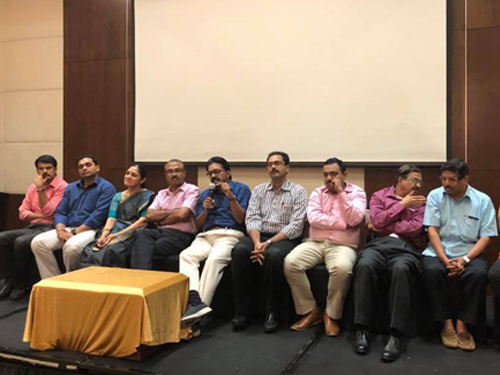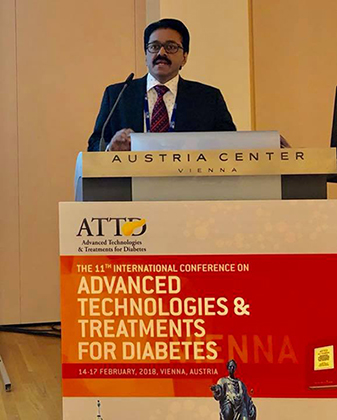
9. JDC Updates |
JPEF Mini CME 2018: 19 January 2018
 |
![]() The first JPEF Mini CME of 2018 was held at Hotel Hilton Garden Inn on 19 January 2018. Dr.Ashwin David discussed the ‘American Diabetes Association Clinical Practice Recommendations 2018’. Dr.Sukesh R.S, Consultant Physician, PRS Hospital chaired the session. Dr.Arun Shankar lectured on ‘Indian Phenotype: a need for treatment intensification’. Dr.Syam Sunder, Prof. of Medicine, General Hospital, Trivandrum chaired the session. Dr.Geetha M Nair, Consultant Nephrologist, PRS Hospital lectured on ‘Existing Renal Replacement therapies in diabetes-cost and concerns’. Dr.Sumesh Raj, Prof.of Medicine, Sree Gokulam Medical College, Venjaramood chaired. Dr.Mathew John, Consultant Endocrinologist, Providence Diabetes Speciality Centre spoke on ‘SGLT2i-more than just glucose excretion-focus on CV and renal complications. Dr.B.Jayakumar, Prof. and Head, Endocrinology and Medicine, SR Medical College, Varkala chaired the session. Dr.Jothydev lectured on ‘Dapa+Met role in treatment optimization’. Dr.Sabeer A Rasheed, Director & CEO, Dr.Rasheed’s Diabetes Speciality Centre, Trivandrum chaired the session.
The first JPEF Mini CME of 2018 was held at Hotel Hilton Garden Inn on 19 January 2018. Dr.Ashwin David discussed the ‘American Diabetes Association Clinical Practice Recommendations 2018’. Dr.Sukesh R.S, Consultant Physician, PRS Hospital chaired the session. Dr.Arun Shankar lectured on ‘Indian Phenotype: a need for treatment intensification’. Dr.Syam Sunder, Prof. of Medicine, General Hospital, Trivandrum chaired the session. Dr.Geetha M Nair, Consultant Nephrologist, PRS Hospital lectured on ‘Existing Renal Replacement therapies in diabetes-cost and concerns’. Dr.Sumesh Raj, Prof.of Medicine, Sree Gokulam Medical College, Venjaramood chaired. Dr.Mathew John, Consultant Endocrinologist, Providence Diabetes Speciality Centre spoke on ‘SGLT2i-more than just glucose excretion-focus on CV and renal complications. Dr.B.Jayakumar, Prof. and Head, Endocrinology and Medicine, SR Medical College, Varkala chaired the session. Dr.Jothydev lectured on ‘Dapa+Met role in treatment optimization’. Dr.Sabeer A Rasheed, Director & CEO, Dr.Rasheed’s Diabetes Speciality Centre, Trivandrum chaired the session.
ATTD, Vienna, 2018
 |
![]() Dr.Jothydev Kesavadev was an invited speaker at the 11th International Conference on Advanced Technologies & Treatments for Diabetes (ATTD 2018), which was held from 14-17 February 2018 in Vienna, Austria. He lectured On ‘SMBG And Virtual Consultation via DTMS® : 20 Years’ Experience’.
Dr.Jothydev Kesavadev was an invited speaker at the 11th International Conference on Advanced Technologies & Treatments for Diabetes (ATTD 2018), which was held from 14-17 February 2018 in Vienna, Austria. He lectured On ‘SMBG And Virtual Consultation via DTMS® : 20 Years’ Experience’.
![]() Jothydev Kesavadev presented the evidence of managing diabetes via a telemanagement system in reducing all the long-term complications of diabetes such as heart attacks, kidney disease, retinopathy etc. in a statistically significant manner. Advanced Technologies and Treatments in Diabetes (ATTD) is the biggest technology convention in the world attended upon by specialists from over 80 countries.
Jothydev Kesavadev presented the evidence of managing diabetes via a telemanagement system in reducing all the long-term complications of diabetes such as heart attacks, kidney disease, retinopathy etc. in a statistically significant manner. Advanced Technologies and Treatments in Diabetes (ATTD) is the biggest technology convention in the world attended upon by specialists from over 80 countries.
![]() Diabetes Tele Management System (DTMS®) was originally perceived in 1997 for customised management of diabetes and individualisation of treatment goals such as glucose, cholesterol and blood pressure. It has a static interface consisting of electronic medical records and a dynamic interface consisting of a multidisciplinary team of professionals including doctors, dietitians, diabetes educators etc. providing round the clock advices on dosages of drugs, diet and exercise, either over the telephone, email or internet since the past 20 years. DTMS was proven to overcome the three major barriers of diabetes such as low sugars, reluctance to glucose monitoring and non-adherence to advices with the help of customised and periodically delivered education via virtual consultations.
Diabetes Tele Management System (DTMS®) was originally perceived in 1997 for customised management of diabetes and individualisation of treatment goals such as glucose, cholesterol and blood pressure. It has a static interface consisting of electronic medical records and a dynamic interface consisting of a multidisciplinary team of professionals including doctors, dietitians, diabetes educators etc. providing round the clock advices on dosages of drugs, diet and exercise, either over the telephone, email or internet since the past 20 years. DTMS was proven to overcome the three major barriers of diabetes such as low sugars, reluctance to glucose monitoring and non-adherence to advices with the help of customised and periodically delivered education via virtual consultations.
![]() Apart from the invited lecture, 3 more original research were presented at the ATTD from Jothydev’s Diabetes Research Centre namely ‘Diabetes duration based initiation of insulin: impact on clinical outcomes, insulin dosage and quality of life’, 'Patient and caregiver feedback on the first generation Artificial Pancreas in India' and ‘Utility of a multi-model BOT enabled and doctor led intervention for diabetes management - clinician and patient perspectives’.
Apart from the invited lecture, 3 more original research were presented at the ATTD from Jothydev’s Diabetes Research Centre namely ‘Diabetes duration based initiation of insulin: impact on clinical outcomes, insulin dosage and quality of life’, 'Patient and caregiver feedback on the first generation Artificial Pancreas in India' and ‘Utility of a multi-model BOT enabled and doctor led intervention for diabetes management - clinician and patient perspectives’.
![]() The common perception among the diabetes community is that insulin is started when all the oral medications fail. The research paper presented at ATTD throws light into the pleiotropic benefits of initiating insulin at the early years of diabetes onset. Early initiation of insulin was found to be highly beneficial in achieving glycemic targets as well as in reducing the total daily dose of insulin and enhancing the quality of life.
The common perception among the diabetes community is that insulin is started when all the oral medications fail. The research paper presented at ATTD throws light into the pleiotropic benefits of initiating insulin at the early years of diabetes onset. Early initiation of insulin was found to be highly beneficial in achieving glycemic targets as well as in reducing the total daily dose of insulin and enhancing the quality of life.
![]() The clinical experience from India using the first generation Artificial Pancreas for diabetes which can automatically suspend insulin (Predictive Low Glucose Suspend) and thereby eliminate hypoglycemia was also presented at the ATTD.
The clinical experience from India using the first generation Artificial Pancreas for diabetes which can automatically suspend insulin (Predictive Low Glucose Suspend) and thereby eliminate hypoglycemia was also presented at the ATTD.
![]() In an era where we embrace apps to make life easy, the clinical utility of a novel multi-model BOT enabled diabetes care platform with machine learning capabilities was explored in a real-world setting. The app which comes equipped with Artificial Intelligence enabled real-time and automated two-way communication between the diabetes care team and the patients, aided structured and customised diabetes education, enhanced adherence to medications and lifestyle, all of which were much appreciated by the users. The research team included Dr.Arun Shankar, Dr.Ashwin David, Lakshmy Ramachandran, Gopika Krishnan, Krishnadev Jothydev and Sunitha Jothydev.
In an era where we embrace apps to make life easy, the clinical utility of a novel multi-model BOT enabled diabetes care platform with machine learning capabilities was explored in a real-world setting. The app which comes equipped with Artificial Intelligence enabled real-time and automated two-way communication between the diabetes care team and the patients, aided structured and customised diabetes education, enhanced adherence to medications and lifestyle, all of which were much appreciated by the users. The research team included Dr.Arun Shankar, Dr.Ashwin David, Lakshmy Ramachandran, Gopika Krishnan, Krishnadev Jothydev and Sunitha Jothydev.
For enquiries info@jothydev.net.
Please visit: jothydev.net | research.jothydev.com | diabscreenkerala.net | jothydev.com/newsletter
